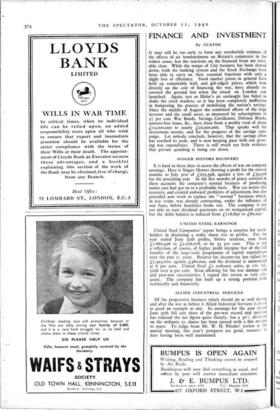FINANCE AND INVESTMENT
By CUSTOS IT may still be too early to form any worthwhile estimate of the effects of air bombardment on Britain's commerce in the widest sense, but the reactions on the financial front are toler- ably clear. While the tempo of City business has been slowed down, both the banking system and the Stock Exchange have been able to carry on their essential functions with only a slight loss of efficiency. Stock market prices in general have held up remarkably well, and gilt-edged prices, which bear directly on the cost of financing the war, have already re- covered the ground lost when the attack on London was launched. Again, just as Hitler's air onslaught has failed to shake the stock markets, so it has been completely ineffective in hampering the process of mobilising the nation's savings. Since the middle of August the combined efforts of the large investor and the small saver, as measured by subscriptions to 21 per cent. War Bonds, Savings Certificates, Defence Bonds, interest-free loans, &c., have risen from a weekly total of about £13,000,000 to nearly L20,000,000. That speaks -well for investment morale, and for the progress of the savings cam- paign. Let nobody conclude, however, that the savings effort has reached its peak, and is now keeping pace with our grow- ing war expenditure. There is still much too little evidence that private spending is being cut down.
SINGER MOTORS RECOVERY It is hard in these days to assess the effects of war on company earnings. Here is Singer Motors showing a profit for the sixteen months to July 31st of £203,398, against a loss of £33,906 for the preceding year. In the five months of peace covered in these accounts the company's normal business of producing motor cars had got on to a profitable basis. War cut across this recovery, and created awkward problems of adjustment, but also provided new work to replace the " normal " business which, in any event, was already contracting, under the influence of war fears, before hostilities broke out. The company is not yet able to start dividend payments on its reorganised capital, but the debit balance is reduced from £118,890 to £60,242.
UNITED STEEL EARNINGS
United Steel Companies' report brings a surprise for stock- holders in disclosing a really sharp rise in profits. For the year ended June 30th profits, before taxation, rose from £7,660,426 to £2,256,078, or by 35 per cent. This is not a reflection, of course, of higher profit margins but of the full benefits of the large-scale programme of capital expenditure over the past 21 years. Reserve for income-tax has called for ,0,493,000, against L480,000, and the dividend is maintained at 8 per cent. United Steel LI ordinary units, at 17s. 6d., yield over 9 per cent. Even allowing for the war damage risk and post-war uncertainties, I regard this return as very ade- quate. The company has built up a strong position both technically and financially.
ALLIED INDUSTRIAL SERVICES Of the progressive business which should do as well during and after the war as before it Allied Industrial. Services is about as good an example as any. Its earnings for the year ended June 3oth fell just short of the pre-war record and taxation has reduced the net figure quite sharply, but a 3o% dividend on the ordinary 5s. shares has been earned with a fair margin to spare. To judge from Mr. W. H. Rhodes' review at the annual meeting, this year's prospects are good, turnover to date having been well maintained.


























 Previous page
Previous page